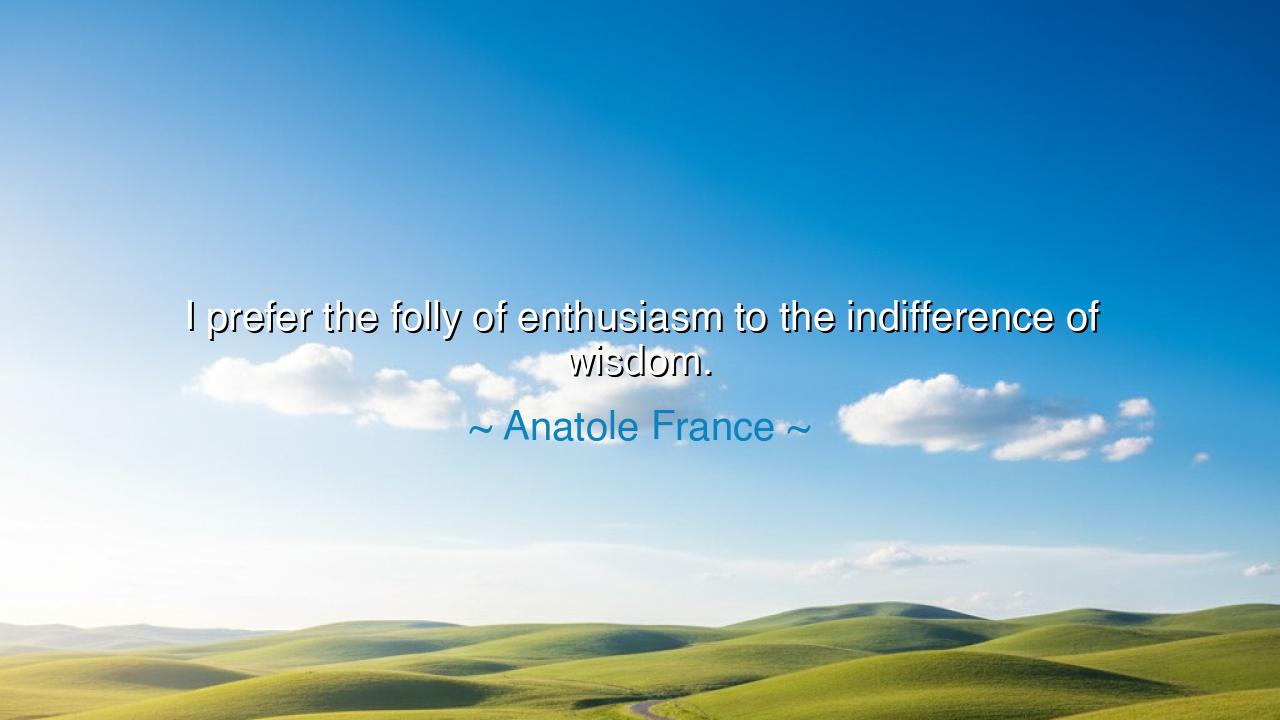
I prefer the folly of enthusiasm to the indifference of wisdom.






The French novelist and thinker Anatole France spoke with the passion of one who valued life’s fire when he declared: “I prefer the folly of enthusiasm to the indifference of wisdom.” In this saying he exalts enthusiasm, even when it appears foolish, above the cold and detached posture of lifeless wisdom. For what is the use of a wisdom that feels nothing, that stirs no heart and kindles no flame? Better, says France, to be carried by the fire of belief, even if mocked as naive, than to wither in the barren frost of indifference.
The origin of this thought lies in France’s reflections on art, politics, and human passion. He lived in a time when skepticism and detached irony were celebrated, yet he recognized that true greatness—whether in literature, love, or reform—comes not from indifference but from ardor. To be alive is to risk folly, to dare, to throw oneself into causes and dreams. The one who loves too much may be a fool, but the one who refuses to love at all has already surrendered to death of the spirit.
History bears witness in the story of Giuseppe Garibaldi, the Italian revolutionary. To some he seemed reckless, a dreamer tilting at impossible unification. Yet his enthusiasm, burning like a flame, inspired thousands to follow him through battle and exile. His vision, though scorned as folly, became the foundation of a new nation. Without such fire, Italy might have remained divided. Here we see France’s truth: that the “folly” of enthusiasm can reshape history, while the “wisdom” of indifference leaves nothing behind.
The ancients too recognized this paradox. The Greeks celebrated Prometheus, who defied the gods to bring fire to mankind. His act was reckless, born of daring, yet it gifted humanity with progress and hope. Meanwhile, the aloof detachment of Olympus often left mortals abandoned in their struggles. Thus myth itself confirms Anatole’s cry: it is the ardent, not the indifferent, who move the world forward.
Therefore, O seekers, do not scorn enthusiasm, even if others call it folly. Let your heart burn with causes, with love, with creation, for these are the forces that carve destiny. The calm mask of indifferent wisdom may protect you from error, but it also steals from you the joy of living greatly. Better to stumble as a passionate fool than to sit safely among the lifeless wise. For in the fire of enthusiasm is found the true breath of the soul.






NTNguyen Nhat Trung
I love the idea of preferring enthusiasm, but I also think there’s wisdom in slowing down and observing. Sometimes, that moment of pause is where deeper understanding is found. Can too much enthusiasm cloud our judgment? Or is it only through that boundless energy that we learn and grow? How do we prevent ourselves from getting too caught up in enthusiasm at the expense of reflection?
MNChu Mai Nhug
I agree with the sentiment here — enthusiasm brings excitement and the possibility of new experiences, while wisdom often seems to temper that energy. However, how do we ensure that enthusiasm doesn’t turn into naive optimism? How can we stay passionate about life while also being aware of its complexities? I think finding a balance between youthful energy and thoughtful insight might be key to living a fulfilling life.
NNNhi Nguyen
This quote feels like a reminder to embrace life fully, but I find myself asking — is it better to be passionate and foolish at times, or is there wisdom in being more measured? Sometimes I feel like enthusiasm can blind us to consequences, while wisdom helps us make better choices. Can the joy and energy of enthusiasm coexist with the reflection and caution of wisdom? I’m curious to explore where the balance lies.
LBDuong Le Bao
I can understand the appeal of preferring enthusiasm over indifference, but I wonder if there's a limit to that. Isn’t some level of wisdom necessary to channel that enthusiasm in a meaningful direction? Can someone be truly wise without experiencing the ebbs and flows of enthusiasm? Maybe there’s a way to blend the two, so that passion doesn’t become aimless and wisdom doesn’t become cold or passive.
NHNguyen Ngoc Ha
This resonates with me, especially in a world that often values pragmatism and caution. Enthusiasm brings energy, passion, and a willingness to take risks, but can it be sustained without balance? Does this kind of enthusiasm lead to meaningful growth, or do we burn out when we ignore the tempered insight wisdom provides? I’m curious whether enthusiasm can ever lead to true wisdom, or if they are always in conflict.